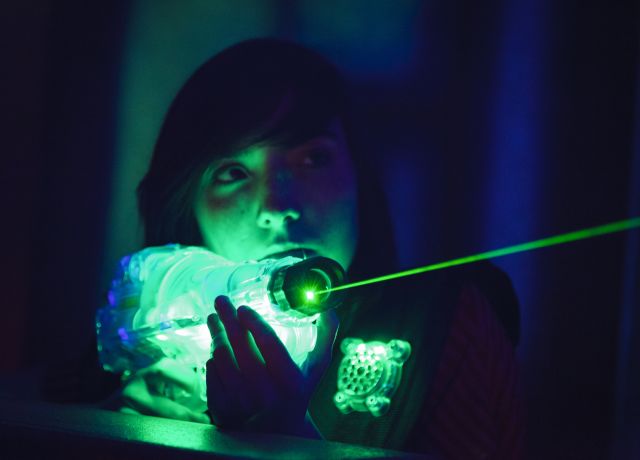If your children are young Jedi in training and love to battle the Force with laser-driven light weapons, here’s something you need to know. More kids and teens than ever are going to emergency rooms with serious eye injuries and burns from strong laser lights.
Laser Toys: Nothing to Play Around With
New, stronger laser lights are nothing to play around with: Even a brief look straight into the bright blue light from some laser gadgets can cause serious eye damage. In a report published in the February 2014 issue of the journal Ophthalmology, doctors at one hospital in Saudi Arabia reported 14 cases of laser-induced eye damage in 2012 and 2013. The injuries ranged from retinal perforations to retinal bleeding. All of the victims were males between the ages 11 and 30. Most needed surgery, and two patients were left with permanent damage to the retina, the part of the eye that makes sight possible.
Related: How to Prepare for your Next Eye Exam
But here’s what got some doctors even more worried: Since the authors wrote that report, they’ve treated at least 16 more patients with similar eye injuries. Experts at Johns Hopkins University say this could be the beginning of a growing trend, and believe children may be confusing new, stronger lasers with toys or the common laser pointers teachers use at school.
The FDA has also issued a warning about flash-blindness from lasers. It says inexpensive lasers with super-powered, highly concentrated light, like the ones in the study, are easy to find online and can be dangerous. They’re also illegal in the U.S., with some over 10 times stronger than is safe. Some are as powerful as the lasers used for medical and industrial purposes.
Protect Your Eyes from a Blinding Accident
If you’ve got laser light gadgets or toys at home, here’s what you need to know to stay safe:
- Make sure lasers meet FDA safety standards. Approved lights all include a statement certifying that the laser complies with FDA safety regulations. And don’t take your chances buying a laser online.
- Don’t let children play with laser pointers, either. They are not toys and the light exposure can cause vision damage over time. The FDA regulates toys that include lasers, such as guns or “light sabers.” If you don’t see a label confirming the light is Class 1 level, don’t buy it.
- Be especially careful with green, violet or blue lights. Human eyes are much more sensitive to these colors, making them much more likely to cause flash-blindness than conventional red laser lights.
- Never aim or point a laser directly at anyone, including pets. The concentrated light energy from a laser can do more damage that looking directly into the sun. Even seeing the light indirectly or reflecting it into a mirror can damage vision.
- Watch out for the “startling effect” of bright light beams. Aiming a laser at someone driving a car, operating machinery, playing a sport or even holding a hot cup of coffee can cause a serious accident. After a rash of laser attacks on pilots, it’s now a federal crime to point a laser at any aircraft or government vehicle.
- Get help if you get hurt. If a laser hurts your eyes, get emergency medical help immediately. All of the injured patients in the Saudi hospital study got help right away, and they all recovered some or most of their vision over time.





